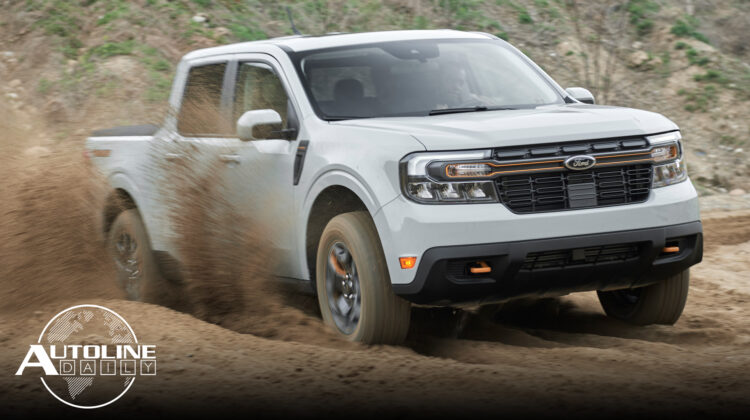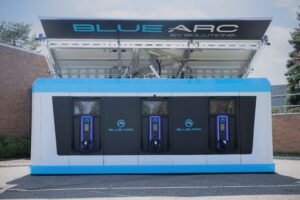
Listen to “AD #3374 – Ford Maverick Gets Tremor Off-Road Package; Renault To Split Off EV Ops; BMW i4 Recalled Over Battery Fires” on Spreaker.
Follow us on social media:
Runtime: 10:11
0:08 Renault To Split Off EV Ops
1:08 Stellantis & GAC In Messy Divorce
2:09 NIO To Launch Low-Cost EV Brand
3:43 Ford Maverick Gets Tremor Off-Road Package
4:44 Mercedes EV Margins on Par with ICE Vehicles
5:33 NHTSA Issues BMW i4 Recall Over Battery Fires
7:26 Shyft Creates Portable EV Charging Unit
8:09 Australia Enacts EV Incentives
8:55 Toyota & Panasonic Lock Up U.S. Lithium Supply
Visit our sponsors to thank them for their support of Autoline Daily: Bridgestone, Intrepid Control Systems, MEDC, Schaeffler and Teijin Automotive.
This is Autoline Daily, the show dedicated to enthusiasts of the global automotive industry.
RENAULT TO SPLIT OFF EV OPS
First Ford did it, and now Renault is doing it. It’s splitting in two. One part of Renault will design, engineer and manufacture EVS, the other part will make ICE vehicles. Renault’s CEO Luca De Meo says he will invite Nissan and Mitsubishi to join the EV side of the business, but it could also involve other automakers and even tech companies. Nissan and Mitsubishi already participate in a collaborative alliance with Renault for ICE vehicles, but it’s unclear if they will join the EV effort. Ford is creating a completely separate EV business, called Ford Model E, because CEO Jim Farley says the electric side of the company has to operate very differently from the ICE side. What do you think? Should traditional automakers split off their EV operations, or should they use their existing ops to make electrics?
STELLANTIS & GAC IN MESSY DIVORCE
Stellantis and its Chinese joint venture partner GAC, the Guangzhou Automotive Company, are getting divorced, and like some divorces things are turning messy. Stellantis CEO Carlos Tavares told Bloomberg that he doesn’t trust GAC, he said that Chinese politicians keep meddling in the business of state owned companies, and that China is enacting policies that favor Chinese brands. GAC called his comments “unbelievable.” It accused Stellantis of disrespecting Chinese customers. Stellantis is going to stop making Jeeps in China and will import vehicles instead. We think it could even turn to a contract manufacturer like Magna or Foxconn to assemble its vehicles in China. Just so you know, GAC also has joint ventures with Toyota, Honda and Mitsubishi.
NIO TO LAUNCH LOW-COST EV BRAND
Chinese automaker NIO, which makes EV luxury cars, will launch a mass market brand called ALPS, like the mountains in Europe. ALPS will start selling EVs priced from $30,000 to $45,000 starting in mid-2024. Then NIO is going to launch an even lower cost brand that will sell a lineup of EVs priced between $15,000 and $30,000. Inside NIO, they refer to the brand strategy as Lexus, Toyota and Suzuki to explain the different segments of the market they’ll go after. And NIO is expected to offer battery swapping with its new brands, just like it does with its luxury cars.
FORD MAVERICK GETS TREMOR OFF-ROAD PACKAGE
It really feels like the chip shortage is starting to ease. Not only are more automakers talking about the shortage coming to an end, but Ford is once again allowing customers to order specific content, like wheels, color, features and technology, rather than just buying what’s on the dealer lot. And soon they’ll be able to tick a box for the Maverick Tremor. Like the Super Duty and F-150 Tremor, this is a light off-road package that is highlighted with orange accents. Building on the FX4 package, the Maverick Tremor features a new all-wheel drive system with multiple terrain modes, unique springs and shocks that raise ride height by 1-inch, a heavy-duty transmission cooler and upgraded half shafts. All of that adds about $3,000 to the price of an FX4 Maverick, which means the Tremor’s price when it launches in September will likely top $30,000.
MERCEDES EV MARGINS ON PAR WITH ICE VEHICLES
Former FCA CEO, Sergio Marchionne, once famously told people not to buy the company’s all-electric version of the Fiat 500 because it lost something like $14,000 to $20,000 on every one it sold. But that’s starting to change. Mercedes’ CFO says that the electric version of the S-Class, the EQS, is “not too far from” being as profitable as the ICE version of the luxury sedan and that the EQE is turning in the same margins as the current ICE E-Class. While we hope this is a sign of things to come, it is important to note that Mercedes’ electric cars cost considerably more than their ICE counterparts.
NHTSA ISSUES BMW i4 RECALL OVER BATTERY FIRES
BMW found a use for the space at its plant in Germany where it used to build the i3, which just recently went out of production. It spent 70 million euros to build a second battery module production line in its place. Those modules will be used for the BMW i4 and iX as well as the next-gen MINI Countryman. And it’s really going to need that extra battery capacity. The National Highway Traffic Safety Administration just issued a recall for some BMW i4 and iX models in the U.S. related to battery fires. BMW gets the cells from Samsung and CATL and the bad ones come from Samsung. The fix is a completely new battery and owners are advised not to park inside, drive the vehicles or charge them. This only affects 83 vehicles in the U.S. but we would expect more if those Samsung batteries are used in other regions of the world as well.
SHYFT CREATES PORTABLE EV CHARGING UNIT
EV charging locations are still lacking in the U.S., so to help fix the problem, the Shyft Group has developed a portable EV charging device called the Power Cube. It does not need to be connected to the grid and has 3MW of onboard power and level 2 and DC fast charging capabilities. That means it can charge vehicles in 1 to 2 hours. The Power Cube can also be supplemented with wind and solar power. It’s designed for commercial vehicle fleets but could also be used for a wide variety of things including military applications, at campgrounds and in natural disasters.
AUSTRALIA ENACTS EV INCENTIVES
To help spur EV adoption, Australia is giving EV buyers a discount. The country just introduced new legislation that will exempt electric vehicles, fuel cells and plug-in hybrids from a fringe benefits tax. It applies to vehicles valued below nearly $85,000 Australian dollars. The tax exemption is also available to employers who provide EVs for staff and its estimated they could save $9,000 on a vehicle valued at $50,000. Australia is aiming to reduce its greenhouse gas emissions to 43% below 2005 levels by 2030 and eventually be net zero by 2050.
TOYOTA & PANASONIC LOCK UP U.S. LITHIUM SUPPLY
Automakers are scrambling to lock up the raw materials they need to produce batteries for electric vehicles. And now Toyota and Panasonic have signed a lithium deal with ioneer. The mining company will supply 4,000 metric tons of lithium carbonate a year from its mine in Nevada over a five-year period. It’s enough lithium to produce batteries for about 150,000 EVs annually. As part of the deal, the lithium must be used in batteries made in the U.S. for the U.S. market. Toyota and Panasonic are reportedly looking to open a battery plant in North Carolina.
But that wraps up today’s show, thanks for watching.
Thanks to our partner for embedding Autoline Daily on its website: WardsAuto.com
Seamus and Sean McElroy cover the latest news in the automotive industry for Autoline Daily.









